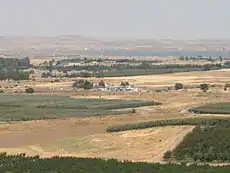United Nations Security Council Resolution 1451
United Nations Security Council resolution 1451, adopted unanimously on 17 December 2002, after considering a report by the Secretary-General Kofi Annan regarding the United Nations Disengagement Observer Force (UNDOF), the Council extended its mandate for a further six months until 30 June 2003.[1]
| UN Security Council Resolution 1451 | |
|---|---|
 Border crossing between Israel and Syria | |
| Date | 17 December 2002 |
| Meeting no. | 4,670 |
| Code | S/RES/1451 (Document) |
| Subject | The situation in the Middle East |
Voting summary |
|
| Result | Adopted |
| Security Council composition | |
Permanent members | |
Non-permanent members | |
The resolution called upon the parties concerned to immediately implement Resolution 338 (1973) and requested that the Secretary-General submit a report on the situation at the end of that period.
The Secretary-General's report pursuant to the previous resolution on UNDOF said that the situation between Israel and Syria had remained calm with no serious incidents though the situation in the Middle East as a whole remained dangerous until a settlement could be reached.[2] Furthermore, it recognised the threat of land mines to UNDOF and the tense situation in the Shebaa farms area.[3]
See also
References
- "Security Council extends Israel–Syria disengagement force until 30 June 2003". United Nations. 17 December 2002.
- Annan, Kofi (4 December 2002). "Report of the Secretary-General on the United Nations Disengagement Observer Force". United Nations.
- United Nations (2004). Yearbook of the United Nations 2002. New York: United Nations Publications. p. 483. ISBN 978-92-1-100904-0.
External links
 Works related to United Nations Security Council Resolution 1451 at Wikisource
Works related to United Nations Security Council Resolution 1451 at Wikisource- Text of the Resolution at undocs.org